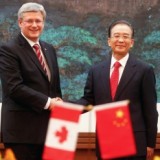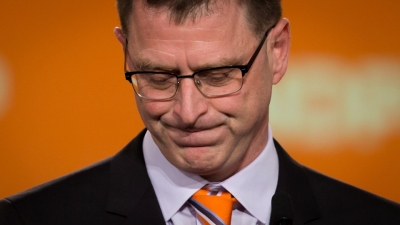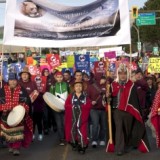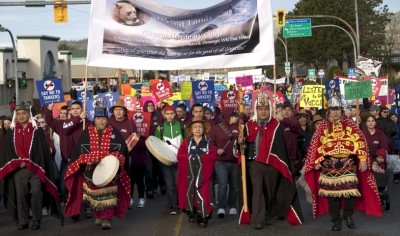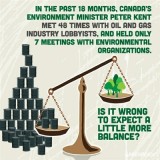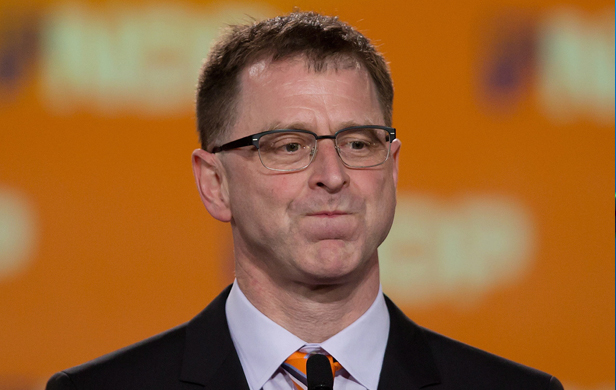The story, by Joyce Nelson, is re-published from Watershed Sentinel.
If Canadians knew the full extent of the Harper government’s war on science, they would be clamouring for the reinstatement and full funding of dozens of federal scientific programs and hundreds of scientists axed over the past year. Since the passage of omnibus budget Bill C-38, the Harper Cabinet has moved at blitzkrieg speed to make these cuts.
Canada’s Information Commissioner, Suzanne Legault, agreed at the end of March to launch an investigation into the extensive muzzling of federally-funded scientists at the Department of Fisheries and Oceans (DFO), Environment Canada, Natural Resources Canada and other federal agencies (1). Her decision comes after a February 20th complaint formally filed by Democracy Watch in partnership with the Environmental Law Clinic of the University of Victoria, which called for a full investigation and was accompanied by a 128-page report, Muzzling Civil Servants: A Threat to Democracy. That report documents systematic silencing since 2007 of federal scientists involved in research on climate change, the Alberta tar sands, fish farms, and other areas (2).
But the muzzling of scientists is only one aspect of Harper’s war on science. Far more troubling is the actual elimination of scientific programs and the firing of scientists. Jim Turk, director of the Canadian Association of University Teachers, puts it well: “The Harper government wants politics to always trump science. It wants its political views to dominate even if science shows that it’s wrong.”
The NDP’s Megan Leslie is even more caustic: “This government has abandoned evidence-based policy-making to pursue its own brand of policy-based evidence-making.”
The New Inquisition
According to information provided to me in March by the Professional Institute of Public Service Canada (PIPSC) – the union which represents federal scientists and other professionals employed by 38 federal government departments – 5,332 of their members have already either lost their jobs or been transferred to other duties. That number includes 139 scientists/professionals at Environment Canada (cut by $53.8 million), and 436 scientists/professionals at Fisheries and Oceans (already cut by $79.3 million, with $100 million more in cuts announced in the latest March 2013 budget). Thousands of unionized support staff have also been cut from these, and other, departments.
Harper claims that his drastic cuts to most federal agencies are necessary in order to eliminate the deficit before the next federal election. But as business writer David Olive recently observed, “Harper’s ultra-low corporate tax [15%] deprives Ottawa of $13.7 billion a year according to Finance’s own estimates. That’s enough to wipe out the deficit in two years without cutting a single program.”
Canada now has the lowest corporate tax rate of G8 member nations. Indeed, according to a 2013 study by the World Bank and the International Finance Corporation, of 185 countries examined, only seven countries have a lower corporate tax rate than Canada.
The DFO has been especially hard hit by Harper’s war on science, with three rounds of cuts and another three to come. The entire ocean contaminants research program has been axed, including laboratories and research stations across Canada. World-renowned scientists have been fired, including Dr. Peter Ross, an expert on contaminants’ effects on marine mammals.
Working out of DFO Institute of Ocean Sciences in Sidney, BC for the past 13 years, Dr. Ross is known for his path-breaking research on dioxins in pulp mill effluent, the effects of flame retardants on beluga whales, the impacts of pesticides on wild salmon, and the effects of industrial contaminants on orca whales.
Dr. Ross told Desmog Canada, “If someone is saying that we have to cut 5 per cebt from every department, that’s one thing. But when you turn around and cut 100 per cent of a program, to me that indicates something more than fiscal restraint. It argues in favour of a targeted reduction of a program for some other reason.”
More than a dozen scientific programs important to Canada’s environment and oceans health have been targeted and dismantled over the past year, while others have been slashed to the bone (2).
The Terrible Toll
DFO’s Habitat Management Program – which monitored the effects of harmful industrial, agricultural and land-development activities on wild fish – is gone. DFO’s teams of experts on ocean contaminants in marine mammals, on marine oil pollution, and on oil spill countermeasures have all been disbanded. Gone too is the Centre for Offshore Oil, Gas and Energy Research – the only agency with the ability to adequately assess offshore projects. Nine out of 11 DFO marine science libraries will be shut. And the Experimental Lakes Area is closed.
At Environment Canada, the Polar Environment Atmospheric Research Laboratory (PEARL) in Nunavut, involved in monitoring the Arctic ozone hole discovered in 2011, has been closed. Similarly, the Canadian Foundation for Climate and Atmospheric Sciences, Canada’s main research foundation on climate change, has been axed. The Canadian Centre for Inland Waters – the most important science monitoring agency for the imperilled Great Lakes – has lost key staff members. Cuts to the Action Plan on Clean Water, which funds water remediation, makes communities more vulnerable to toxics.
Harper’s war on science has also eliminated the Hazardous Materials Information Review Commission, the independent agency that ensured fracking companies complied with regulations. And by dismantling the Smokestacks Emissions Monitoring Team at Environment Canada, the government has eliminated “the only Canadian group capable of writing and supervising credible testing methods for new and existing rules to impose limits on pollution from smokestacks”.
In other cuts that are environment-related, the Cereal Research Centre in Winnipeg – which developed popular spring wheat varieties for Western Canada – is set to close in April 2014. Even the National Research Council’s world-renowned Canada Institute for Scientific & Technical Information (CISTI) has been cut drastically. These are the people who solve issues such as responding to pandemics, and maintaining food and product safety. Gary Goodyear, Minister of State for Science and Technology, has consistently defended the Harper government from accusations of a war on science by emphasizing the $5.5 billion that the Feds have provided to the Canada Foundation for Innovation (CFI), including another $225 million to the CFI in Economic Action Plan 2013 released on March 21.
The Canada Foundation for Innovation
The CFI – the key decision-maker for all science funding in Canada – has a governing body of 13 members, seven of whom are appointed by the Minister of Industry (Christian Paradis). These members then select the other six members.
This governing body then appoints seven of the 13 CFI Board of Directors, receives reports from the Board, appoints auditors, approves the Annual Report, sets strategic objectives and makes final decisions about what science projects will be funded, including at universities. According to the CFI website, the Members are “similar to a company’s shareholders, but representing the Canadian public.”
But a look at the CFI Members indicates that it is a highly politicized body (including a founding trustee of the Fraser Institute) that is making the decisions about what science to support with its $5.5 billion in taxpayer dollars.
For example, CFI Co-Chair David Fung is so thoroughly embedded in China-Canada business/trade collaboration that he may as well be seen as a de facto vice-president of CNOOC (China National Offshore Oil Corp.).
The other Co-Chair, Roland Hosein, is a vice-president of GE Canada, a company that is thoroughly engaged in promoting “energy export corridors” and water-privatization efforts across Canada, including the Global Energy Network Institute (GENI) and (with Goldman Sachs) the Aqueduct Alliance.
Meanwhile, the Board of Directors of the CFI includes the president/CEO of the Montreal Economic Institute (a perennial advocate of bulk water export), and an executive for Husky Energy (whose Hong Kong billionaire owner Li Ka-Shing is buying up water/utilities around the globe).
Otherwise, both the CFI Members List and the CFI Board are packed with corporate biotechnology representatives.
So Harper’s war on science has some obvious goals, including getting rid of all federally-funded science that would impede water export, as well as any science standing in the way of aquaculture, tar sands and natural gas export.
As Maude Barlow and renowned freshwater scientist David Schindler wrote in The Star Phoenix, “The Harper government is systematically dismantling almost every law, regulation, program or research facility aimed at protecting freshwater in Canada and around the world.” Harper even killed the Global Environmental Monitoring System, an inexpensive project that monitored 3,000 freshwater sites around the world for a UN database.
The “One-for-One” Rule
In 2010, the Harper government created the Red Tape Reduction Commission, a little-known advisory body overseen by Treasury Board’s Tony Clement and packed with private-sector members. They came up with a strategy for “reducing the regulatory burden on businesses to better enable them to make needed investments in productivity and job creation.” Called the “one-for-one” rule, the measure “requires regulators to remove a regulation each time they introduce a new regulation that imposes new administrative burden on business.” The Harper government adopted the “one-for-one” rule in January 2013, with Treasury Board bragging that “Canada will be the first country to give such a rule the weight of legislation.”
Of course, the Harper government has already wiped out most federal environmental regulation with omnibus budget bills C-38 and C-45. And now, with the war on science, a few beancounters left in federal departments will be tasked with choosing which rule to eliminate if a new regulation is added.
That kind of stupidity is what has made the Harper Conservatives (and Canada) look truly medieval to much of the scientific world.
Now the Harper government is scrambling to look “green” and “scientific” in order to get U.S. approval for its Keystone XL dilbit export pipeline and to bolster various trade issues (including the Fuel Quality Directive) pending with Europe. But having axed so much environmental and climate science, including the Canadian Foundation for Climate and Atmospheric Sciences, and having fired hundreds of scientists across the land, the Harper Cabinet looks like nothing less than the New Inquisition dressed in a cowboy hat.
Joyce Nelson is an award-winning freelance writer/researcher and the author of five books.
(1) Information Commissioner To Investigate Muzzling of Federal Scientists
At the end of March 2013, Canada’s federal Information Commissioner, Suzanne Legault, agreed to launch an investigation into the muzzling of federally-funded scientists at the departments of Fisheries and Oceans (DFO), Environment Canada (EC), Natural Resources Canada (NRCan) and other federal agencies.
Sporadic mainstream media reports since 2008 have attempted to highlight the muzzling of Canada’s scientists, who have been prevented from giving interviews with journalists and speaking freely about their taxpayer-funded research. In February 2012 BBC News reported the findings of Canadian journalist Margaret Munro: “The Postmedia News journalist obtained documents relating to interview requests using Canada’s equivalent of the Freedom of Information Act. She said the documents show interview requests move up what she describes as an ‘increasingly thick layer of media managers, media strategists, deputy ministers, then go up to the Privy Council Office, which decides yes or no’.”
The Privy Council Office (PCO) supports and takes its orders from the Prime Minister’s Office (PMO), but it has a certain degree of power in its own right. The Clerk of the Privy Council is Wayne G. Wouters. The President of the Privy Council is Denis Lebel (Minister of Transport, Infrastructure & Communities; Minister of Intergovernmental Affairs; and Minister of the Economic Development Agency of Canada for the Region of Quebec). There are four other Harper Cabinet Ministers in the PCO: Marjory LeBreton (Leader of the Government in the Senate); Peter Van Loan (Leader of the Government in the House of Commons); Gordon O’Connor (Minister of State and Chief Government Whip); and Tim Uppal (Minister of State for Democratic Reform).
Just how thoroughly Suzanne Legault will investigate this chain of command in terms of the muzzling remains to be seen.
(2) Environmental Science Axed by the Harper government (2012-2013)
Department of Fisheries & Oceans
Programs discontinued:
• Species-at-Risk Program
• Ocean Contaminants & Marine Toxicology Program
• Habitat Management
• Experimental Lakes Area (Northern Ontario) *St. Andrews Biological Station (New Brunswick)
• Centre for Offshore Oil & Gas Energy Research
• Kitsilano Coast Guard Station
Budget slashed:
• Institute of Ocean Sciences (Sidney, B.C.)
• Freshwater Institute – Winnipeg
• Oil Spill Counter-Measures Team
• Canada Coast Guard
• Maurice-Lamontagne Institute (Quebec)
• Marine Science Libraries
Environment Canada
Programs discontinued:
• Environmental Emergency Response Program
• Urban Wastewater Program
• Polar Environment Atmospheric Research Laboratory (Nunavut)
• Canadian Foundation for Climate and Atmospheric Sciences
• Smokestacks Emissions Monitoring Team
• Hazardous Materials Information Review Commission
• National Roundtable on the Environment and the Economy
Budget slashed:
• Environmental Protection Operations
• Compliance Promotion Program
• Action Plan on Clean Water
• Sustainable Water Management Division
• Environmental Effects Monitoring Program
• Contaminated Sites Action Plan
• Chemicals Management Plan
• Canadian Centre for Inland Waters (Burlington, Ont.)
Natural Resources Canada (NRC)
Budget slashed:
• Reduced science capacity for oversight and research
National Research Council
Budget slashed:
• Canada Institute for Scientific & Technical Information
Transport Canada
Budget slashed:
• Transportation of Dangerous Goods (pipeline and tankers oversight)
• Transport Canada Aircraft Services
Other
Programs discontinued:
• Arctic Institute of North America’s Kluane Research Station
• The Global Environmental Monitoring System
• Cereal Research Centre (Winnipeg)
• Canadian Environmental Network
• Prairies Regional Office: Canadian Environmental Assessment Agency
• The Research Tools and Instruments Grant Program
• Grants Programs administered by Natural Sciences and Engineering Research Council (NSERC)
Budget slashed:
• The Centre for Plant Health (Vancouver Island)
• Canadian Science Centre for Human and Animal Health (Winnipeg)
• Horticulture Research & Development Centre (Quebec)
• Plant Pathology Program (Summerland, B.C.
• The Great Lakes Forestry Centre (Toronto)
• The National Water Research Institute (Burlington, Ont.)
• Prairie Farm Rehabilitation Administration
